|
|
Rugged Computing Case Studies
The Power to Save Lives — Handheld technology helps develop reliable electricity sources for healthcare in developing countries
by Jim Moore
Healthcare is essential to human survival. Access to trained practitioners, clean facilities, and vital medications and supplies makes the difference between life and death, especially in the developing world.
But effective modern healthcare requires electricity. Without reliable power, the best doctors and clinics can be left helpless. Thanks to forward-thinking work from Great Lakes Energy and the powerful mobile technology of the rugged Handheld Algiz 7 tablet, rural healthcare clinics in Rwanda are helping create a model for efficient, dependable energy production that will save lives.
Access alone is not enough
Tremendous strides have been made in providing access to healthcare in the developing world — and yet 75 percent of the world's population relies on healthcare from facilities that suffer from an insufficient or intermittent energy supply. The results are profound: As an example, the World Health Organization (WHO) reports that women giving birth in developing countries are 300 times more likely to die. A lack of electricity is central to this risk — often there is medical equipment available, such as an infant warmer or CPAP machine for a struggling infant, but no power to run it. A solar power system may even be installed but not operating.
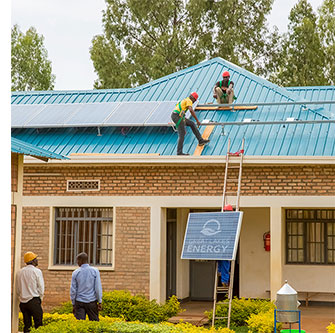 This dilemma is what Great Lakes Energy (GLE) is aiming to solve. Their CEO, Sam Dargan, describes GLE as "a solar innovation company." For the past decade, GLE has been immersed in the energy challenges of rural healthcare, focusing on photovoltaic (PV) solar systems as a solution to power needs. This dilemma is what Great Lakes Energy (GLE) is aiming to solve. Their CEO, Sam Dargan, describes GLE as "a solar innovation company." For the past decade, GLE has been immersed in the energy challenges of rural healthcare, focusing on photovoltaic (PV) solar systems as a solution to power needs.
GLE is developing a self-contained solar energy generation system called SESH (Solar Energy Services for Healthcare) that can supply constant and clean power to healthcare facilities. The system can be monitored in real time, allowing operators to prevent failures before they occur. SESH also monitors a variety of healthcare functions, from refrigerator temperatures for vaccine storage to usage patterns of lights and medical equipment.
The challenges in implementing SESH systems are daunting. The facilities GLE works with are typically rural and off the power grid. And healthcare clinics have continual but highly unpredictable energy demands, with spiking needs at irregular intervals. So two years ago, Dargan and GLE "embarked on a journey to find a way to make PV a much more sustainable electrification resource."
But testing, adjusting and perfecting a system like SESH requires data — lots of data. In remote areas, under rugged conditions. And all they had was standard laptop computers.
"The roads here are very rough," Dargan says. "Carrying company laptops into the field resulted in a high failure rate for our computers."
Rugged technology for remote fieldwork
This was a perfect opportunity for Handheld's powerful Algiz 7 tablet. The rugged Algiz 7 features an Intel Atom processor, along with massive 128 GB storage capacity and 4 GB of DDR3 RAM. It also meets stringent MIL-STD-810G U.S. military standards for withstanding humidity, vibration, drops and extreme temperatures, and meets IP65 standards for sealing out dust and water. But despite its brawn, this rugged tablet is compact and portable, weighing only 1.1 kg (2.4 pounds). Its vivid 7-inch touchscreen displays data clearly, and 10 function buttons and an on-screen soft QWERTY keyboard make operation easy and intuitive.
"This is the kind of technology that unlocks possibilities for a worthwhile project like Great Lakes Energy's work in Rwanda," says Carsten Billeschou, Managing Director for Handheld Europe. "A remote project like this is only successful if its equipment holds up, and the Algiz 7 is a perfect tool for a noble goal. We were glad to help."
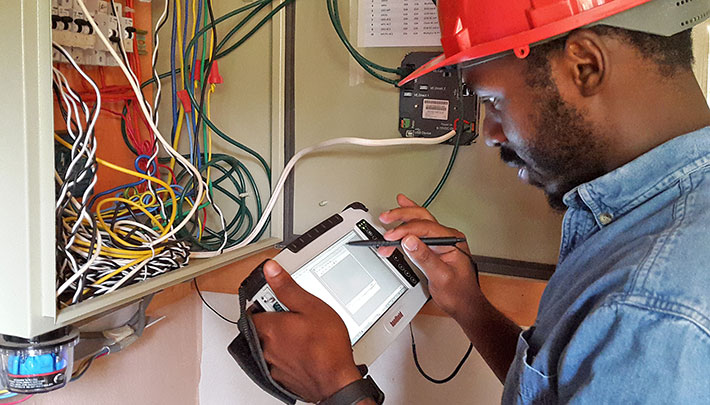
Turning raw data into refined strategies
So GLE put its Algiz 7 to work. Its lead role is to collect the critical data that informs the design and refinement of the SESH system. The project approach is to blanket Rwanda's rural healthcare system with sensors that measure energy performance and status, and measure how each clinic's staff uses electricity.
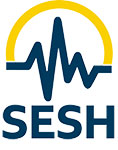 Data loggers, which collect specific information on energy use — timing, type, load levels — are installed in numerous health centers across Rwanda. As Dargan puts it, "We need to data-log very specific aspects of system performance. We leave each logger in place for two weeks, after which we collect the data. The Algiz 7 is perfect for this; using it, we can download the data and then reinstall the logger in the next nearest clinic, without having to return to our office." Data loggers, which collect specific information on energy use — timing, type, load levels — are installed in numerous health centers across Rwanda. As Dargan puts it, "We need to data-log very specific aspects of system performance. We leave each logger in place for two weeks, after which we collect the data. The Algiz 7 is perfect for this; using it, we can download the data and then reinstall the logger in the next nearest clinic, without having to return to our office."
With data from multiple points in the field, GLE uses specialized software loaded right onto the Algiz 7 to analyze the data and manipulate the inverters their PV systems use to control energy flow.
Not only that, but the software generates SMS (text) messages directly to each clinic's staff, advising them how to consume energy in ways that won't crash or overdraw their solar energy system.
"A lab technician receives a notice that, due to excess energy production, right now is a good time to run the autoclave," Dargan says. "And the nurse receives a notice that she's left the lights on in the middle of the day."
The system can also apply the energy-use data to make regular maintenance services more predictable going forward, and to quantify the impact of a reliable energy source.
"We're looking for formulas for things like kilowatt hours per patient served or service rendered," Dargan explains.
Shaping the future of rural healthcare
The Algiz 7 rugged tablet has been instrumental in bringing all the aspects of the project together. First and foremost, it's a perfect tool for remote sites. "The compact form, rugged build and serial ports have made the Algiz 7 extremely useful for our work in the field," says Ivan Asiimwe, an electrical engineer for GLE.
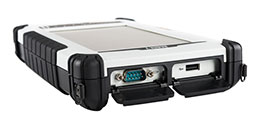 "The device has been really useful for us," agrees Dargan. "We're using it daily as we fight our way through these tech development challenges." "The device has been really useful for us," agrees Dargan. "We're using it daily as we fight our way through these tech development challenges."
And the future of rural healthcare is brighter because of GLE's work.
"The long-term objective is to understand two things," Dargan continues. "First, the energy demand a fully operational health center should have, given a certain size population. And second, the impact of energy usage on health center finances. These data will help us design and build better systems for health facilities."
The function of the Algiz 7 is an integral element of this work — but it's one piece in a very large puzzle.
Dargan takes a moment to neatly sum up the big picture: "The technology enables the data. The data enables the services. The services increase the value of the energy system to healthcare providers and officials. The reliable supply of electricity saves lives."
See Handheld Algiz 7 product page
See Great Lake Energy's SESH project
Handheld Group AB
Kinnegatan 17A
531 33 Lidköping, Sweden
Tel: +46 (0) 510 54 71 70
Fax: +46 (0) 510 282 05
Web: www.handheldgroup.com
Email: info at handheldgroup.com
|
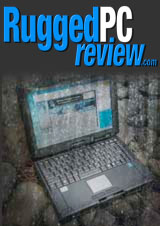



 This dilemma is what Great Lakes Energy (GLE) is aiming to solve. Their CEO, Sam Dargan, describes GLE as "a solar innovation company." For the past decade, GLE has been immersed in the energy challenges of rural healthcare, focusing on photovoltaic (PV) solar systems as a solution to power needs.
This dilemma is what Great Lakes Energy (GLE) is aiming to solve. Their CEO, Sam Dargan, describes GLE as "a solar innovation company." For the past decade, GLE has been immersed in the energy challenges of rural healthcare, focusing on photovoltaic (PV) solar systems as a solution to power needs.

 Data loggers, which collect specific information on energy use — timing, type, load levels — are installed in numerous health centers across Rwanda. As Dargan puts it, "We need to data-log very specific aspects of system performance. We leave each logger in place for two weeks, after which we collect the data. The Algiz 7 is perfect for this; using it, we can download the data and then reinstall the logger in the next nearest clinic, without having to return to our office."
Data loggers, which collect specific information on energy use — timing, type, load levels — are installed in numerous health centers across Rwanda. As Dargan puts it, "We need to data-log very specific aspects of system performance. We leave each logger in place for two weeks, after which we collect the data. The Algiz 7 is perfect for this; using it, we can download the data and then reinstall the logger in the next nearest clinic, without having to return to our office."
 "The device has been really useful for us," agrees Dargan. "We're using it daily as we fight our way through these tech development challenges."
"The device has been really useful for us," agrees Dargan. "We're using it daily as we fight our way through these tech development challenges."